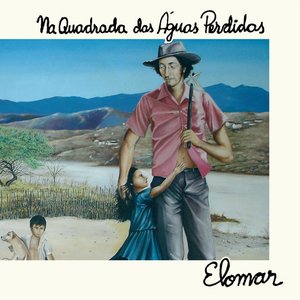Elomar Figueira de Mello is a Brazilian Northeastern composer from the rura… Read Full Bio ↴Elomar Figueira de Mello is a Brazilian Northeastern composer from the rural area of Vitória da Conquista, in the state of Bahia. The son of a prosperous farmer and his Methodist wife, he has grown up under the influence of both the Christian, Protestant faith and of violeiros, the troubadours that range all Brazilian hinterland singing their own and others’s compositions, with themes related to the cordel literature.
He tried to study Music with a Swiss professor living in Brazil, but their ideas about roots music were incompatible, Elomar having a vision both more dynamic and more linked to the mentality of the people, while still fully committed to the sophistication and quality of Classical music; while his teacher wanted, and produced, a fully Contemporary music with influences from the region. Elomar’s music, while keeping the Classical forms of operas, cantatas, oratorios and other sacred music, has a distinctive Mediæval flavour, Elomar maintaining in his characteristic, idiosyncratic speech that ‘Brazilian Northeast is the last time of the Middle Ages’ (‘O Nordeste é o último tempo da Idade Média’).
He was Secretary of Urbanism for Vitória da Conquista for a while. Now he keeps a home at the city but spends most of his time in his goat-raising farm, where he shares in the work of the farm and direct it, besides writing down his music. He says he has most of it ready in his mind, and he only asks God time enough to live to be able to write it all down.
Elomar has a passion for European culture with a strong preference for the French, while totally rejecting the Anglo-Saxon one. He is nearly a Luddite, thinking all technology misused. He is deeply religious and thinks all modern European culture dead and sick.
His music, while not too difficult to hear, is quite sophisticated and manages to successfully combine both modern and Mediæval elements. It carries expressions of deep faith both by the author himself and the poetical egos. It has some striking themes to it, some universal – like Incelença ad Moribundum Solem, a requiem thanking God for all the services the Sun has performed us, to be sung when it finally dies somewhere in the future – and some parochial, like the fate of specific, if fictional violeiros and migrants from the dry, feudalised lands of the Northeast to the rich, industrial lands of the Southeast.
Some connoisseurs consider him the greatest living musician, because he manages to do Classical music that is modern and relevant to today's time while still being deeply stepped in his region’s mentality and beliefs, totally avoiding the Nihilism seen as dominating modern art in general and Contemporary music specifically.
From 2000 to 2004 he lived at Lagoa Real, trying to form a ‘sertaneza’ (country) opera project.
He tried to study Music with a Swiss professor living in Brazil, but their ideas about roots music were incompatible, Elomar having a vision both more dynamic and more linked to the mentality of the people, while still fully committed to the sophistication and quality of Classical music; while his teacher wanted, and produced, a fully Contemporary music with influences from the region. Elomar’s music, while keeping the Classical forms of operas, cantatas, oratorios and other sacred music, has a distinctive Mediæval flavour, Elomar maintaining in his characteristic, idiosyncratic speech that ‘Brazilian Northeast is the last time of the Middle Ages’ (‘O Nordeste é o último tempo da Idade Média’).
He was Secretary of Urbanism for Vitória da Conquista for a while. Now he keeps a home at the city but spends most of his time in his goat-raising farm, where he shares in the work of the farm and direct it, besides writing down his music. He says he has most of it ready in his mind, and he only asks God time enough to live to be able to write it all down.
Elomar has a passion for European culture with a strong preference for the French, while totally rejecting the Anglo-Saxon one. He is nearly a Luddite, thinking all technology misused. He is deeply religious and thinks all modern European culture dead and sick.
His music, while not too difficult to hear, is quite sophisticated and manages to successfully combine both modern and Mediæval elements. It carries expressions of deep faith both by the author himself and the poetical egos. It has some striking themes to it, some universal – like Incelença ad Moribundum Solem, a requiem thanking God for all the services the Sun has performed us, to be sung when it finally dies somewhere in the future – and some parochial, like the fate of specific, if fictional violeiros and migrants from the dry, feudalised lands of the Northeast to the rich, industrial lands of the Southeast.
Some connoisseurs consider him the greatest living musician, because he manages to do Classical music that is modern and relevant to today's time while still being deeply stepped in his region’s mentality and beliefs, totally avoiding the Nihilism seen as dominating modern art in general and Contemporary music specifically.
From 2000 to 2004 he lived at Lagoa Real, trying to form a ‘sertaneza’ (country) opera project.
More Genres
No Artists Found
More Artists
Load All
No Albums Found
More Albums
Load All
No Tracks Found
Genre not found
Artist not found
Album not found
Search results not found
Song not found
Na Quadrada das Águas Perdidas
Elomar Lyrics
A Meu Deus um Canto Novo Bem de longe na grande viagem, sobrecarregado para o descans…
A Pergunta Ô Quilimero Assusta meu irmão Iantes mêrmo que nóis dois sa…
Canto do Guerreiro Mongoió Uiúre iquê uatapí apecatú piaçaciara Unheên uaá uicú arauaqu…
O Rapto de Joana do Tarugo Enfrentei fosso muralha e os ferros dos portais Só pela gra…
